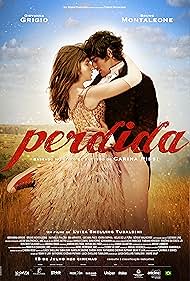Diego Montez’s film debut
Story
Sofia is a progressive and independent girl who is terrified of the word marriage. The only love stories in her life are Jane Austen’s. Until she is mysteriously transported to the 19th century. With Jules & Jim – Rakkauden hymy (1962).
Plot twist: it ends up being a pleasant and humorous film, one of those films where you really have fun
I was quite surprised by this, in a good way, since most of what concerns the fantasy and “what if” genre has already been said and is usually a tired kind of stuff, except for the new audience to come, but “Perdida” (“Lost”) actually had some nice points to share, a somewhat fresh vision and a fresh presentation of certain things despite the heavy load of clichés that most of us know from both romance novels and fantasy themes. It is based on a best-selling novel (which I have not read), so what attracted me were the fantasy themes and some of the names of the cast. It follows Sofia (Giovanna Grigio), a modern-day independent woman, a huge fan of Jane Austen novels who wished her love life was exactly like swooning over a noble and kind Mr. Darcy type.
So, the film makes an interesting comparison between the period, the love story of the classic novels with modern times and how those two could connect
But in the age of hookup/dating apps and falling apart romance, the dream is only real in books, or so she thinks until she is transported to the 19th century in a place that feels like a mix between Brazil and England, and somehow racial diversity is fully embraced (loved, but a lot of people will get confused about this), and that’s where she accidentally stumbles upon the young, charming and respectable Ian Clarke (Bruno Montaleone). The rest is up to you to fill in the blanks as to how the confusion grows between beings from different eras, different behaviors and social mores, and whether there will be any love going on. The production values were incredible, from the costumes and the art direction to the location (I’m not sure where those beautiful landscapes where Sofia and Ian ride their horses were shot), the package was well presented in a big way. And if there is a certain urgency to “Perdida” or at least an audience for it are those who feel exactly like Sofia, who live and deal with an incredible technological age, and the ability to believe in love and marriage outside of a simple social contract; but the era we have is lacking in human connection, real affection (as if the Austen period was totally that perfect).
Fiction as fiction, but sometimes there are touches that reach reality
if ever. With these questions, there is a lot of humor, the couple is very charming just like the secondary characters: Ian’s sister (Nathália Falcão) was my favorite, being enchanted by the sunglasses and always available to Sofia. However, as a story that throws a few punches at clichés, be they fantasy, literature or real-life clichés, “Perdida” is almost lost on them for a long time, but it’s one of those things that always attracts the audience that loves those themes but scares away those who feel exhausted by repetition. It didn’t bother me much and I managed to be surprised by a couple of things, and the conclusion seemed pretty fair for everything that was presented.
Live and learn
7/10.



 18/37
18/37
0 Comments